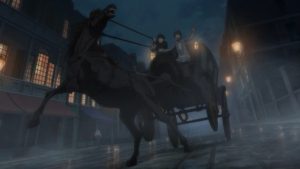 I have to say, Sherlock has hit Moriarty the Patriot like a B-12 shot (or The Mango). And while it may be a little premature for the series to be shouting “I’m back, Baby!”, things have developed as I didn’t quite dare to hope they would two weeks ago. I was pretty close to the edge to be honest, which would have been a massive disappointment given how I felt about this show after the childhood arc. But now it looks like we’re going to see out the last two episodes of this cour and leave the series in pretty good shape as it goes on a one-season hiatus.
I have to say, Sherlock has hit Moriarty the Patriot like a B-12 shot (or The Mango). And while it may be a little premature for the series to be shouting “I’m back, Baby!”, things have developed as I didn’t quite dare to hope they would two weeks ago. I was pretty close to the edge to be honest, which would have been a massive disappointment given how I felt about this show after the childhood arc. But now it looks like we’re going to see out the last two episodes of this cour and leave the series in pretty good shape as it goes on a one-season hiatus.
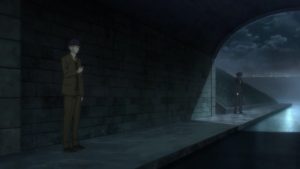 There is still the non-trivial problem that Moriarty is the protagonist and Holmes the adversary, which is a problem because Holmes is a vastly more engaging character. But my hope now is that the contrast between the two camps – the dour, arrogant narcissism of William’s group against the playful eccentricity of Sherlock’s – will allow each of them to be at their best. In order for that to happen Sherlock can be no fool, no mere foil – and for this episode at least, he certainly wasn’t.
There is still the non-trivial problem that Moriarty is the protagonist and Holmes the adversary, which is a problem because Holmes is a vastly more engaging character. But my hope now is that the contrast between the two camps – the dour, arrogant narcissism of William’s group against the playful eccentricity of Sherlock’s – will allow each of them to be at their best. In order for that to happen Sherlock can be no fool, no mere foil – and for this episode at least, he certainly wasn’t.
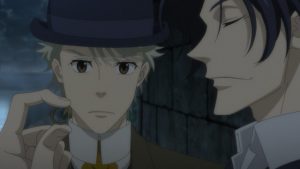 In truth, the case William gave Sherlock to solve wasn’t especially challenging. Not for a man of either of their talents. But I suspect the solving wasn’t the point, but the decision Moriarty forced on Sherlock in the end (which said a lot about both of them). In order to bring things to a resolution Sherlock had to escape, which he knew Lestrade would facilitate. It is a rather fortunate turn that Jefferson Hope (who the series makes a Brit instead of an American, which seems an odd change given how little importance it had to this version’s plot) conveniently leaves his wedding band behind at the scene of Debbers’ murder, but blame Sir Arthur for that one.
In truth, the case William gave Sherlock to solve wasn’t especially challenging. Not for a man of either of their talents. But I suspect the solving wasn’t the point, but the decision Moriarty forced on Sherlock in the end (which said a lot about both of them). In order to bring things to a resolution Sherlock had to escape, which he knew Lestrade would facilitate. It is a rather fortunate turn that Jefferson Hope (who the series makes a Brit instead of an American, which seems an odd change given how little importance it had to this version’s plot) conveniently leaves his wedding band behind at the scene of Debbers’ murder, but blame Sir Arthur for that one.
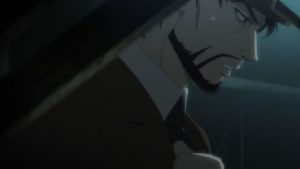 Joining the fray here are the Baker Street Irregulars, the gang of urchins led by Bill Wiggins (Murase Ayumu) who assist Sherlock far more than Scotland Yard does. In the Holmes-centric originals at least the Irregulars are tremendously important side characters, especially Wiggins, but so far they play a minor role here. That is, to find the cabbie that Holmes has already deduced is the likely killer of Count Debbers. It’s Fred who answers Holmes’ ad and picks up the ring, disguised as an old woman. Making Fred (who Holmes called a remora to Moriarty’s shark in the original) into a superhero is another somewhat odd bit of creative license Yuukoku takes.
Joining the fray here are the Baker Street Irregulars, the gang of urchins led by Bill Wiggins (Murase Ayumu) who assist Sherlock far more than Scotland Yard does. In the Holmes-centric originals at least the Irregulars are tremendously important side characters, especially Wiggins, but so far they play a minor role here. That is, to find the cabbie that Holmes has already deduced is the likely killer of Count Debbers. It’s Fred who answers Holmes’ ad and picks up the ring, disguised as an old woman. Making Fred (who Holmes called a remora to Moriarty’s shark in the original) into a superhero is another somewhat odd bit of creative license Yuukoku takes.
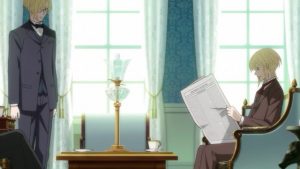 Debbers is, to be sure, another of this series’ monstrous aristocrats – molesting and killing lower-class women and then buying the survivors’ silence. But that this is tangential to the plot is what makes this arc work. Sherlock isn’t especially interested in Debbers, or even in Hope – he wants to know the man who’s pulling the strings. And that’s just the deal that Hope offers him in the end – in exchange for ending his life, a pre-arrangement means Fred will tell Sherlock who Hope’s benefactor is. All Sherlock has to do is kill Hope – which is what the dying man wants anyway.
Debbers is, to be sure, another of this series’ monstrous aristocrats – molesting and killing lower-class women and then buying the survivors’ silence. But that this is tangential to the plot is what makes this arc work. Sherlock isn’t especially interested in Debbers, or even in Hope – he wants to know the man who’s pulling the strings. And that’s just the deal that Hope offers him in the end – in exchange for ending his life, a pre-arrangement means Fred will tell Sherlock who Hope’s benefactor is. All Sherlock has to do is kill Hope – which is what the dying man wants anyway.
 Never mind Watson’s reaction (which is certainly in-character). If Sherlock had accepted this deal, he would have been ruined as a character, and I’m glad the series gets that. Of course Sherlock isn’t interested in information he hasn’t earned, and that as much as his disinclination to shoot a defenseless man (even one who wants to be shot) is the reason he refuses the deal. But even more important is what offering it says about William. He wants to know if his potential opponent is a reflection of him, or someone completely different. And it’s the latter. For William, everything is about the cause and everything is justified in its name. But for Sherlock, it’s all about the game – he cares less about the quarry than the hunt. And that makes him interesting enough to draft into the play William is about to stage.
Never mind Watson’s reaction (which is certainly in-character). If Sherlock had accepted this deal, he would have been ruined as a character, and I’m glad the series gets that. Of course Sherlock isn’t interested in information he hasn’t earned, and that as much as his disinclination to shoot a defenseless man (even one who wants to be shot) is the reason he refuses the deal. But even more important is what offering it says about William. He wants to know if his potential opponent is a reflection of him, or someone completely different. And it’s the latter. For William, everything is about the cause and everything is justified in its name. But for Sherlock, it’s all about the game – he cares less about the quarry than the hunt. And that makes him interesting enough to draft into the play William is about to stage.
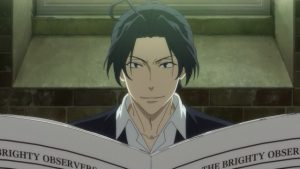 What really matters in the end is whether each of these two men has the measure of the other, or whether they’re underestimating their opponent. For the sake of the narrative it works best if each of them is underestimating the other, so I obviously hope that’s what happens. Both Holmes and Moriarty need to refuse to let the other play by the rules they’d prefer to play by – if they’re not the ultimate irritant to the other, they don’t work as a couple (and neither one would feel satisfied). I still don’t know if that’s where Yuukoku no Moriarty is headed, but I feel better about our chances than I did when Sherlock first entered, stage left.
What really matters in the end is whether each of these two men has the measure of the other, or whether they’re underestimating their opponent. For the sake of the narrative it works best if each of them is underestimating the other, so I obviously hope that’s what happens. Both Holmes and Moriarty need to refuse to let the other play by the rules they’d prefer to play by – if they’re not the ultimate irritant to the other, they don’t work as a couple (and neither one would feel satisfied). I still don’t know if that’s where Yuukoku no Moriarty is headed, but I feel better about our chances than I did when Sherlock first entered, stage left.


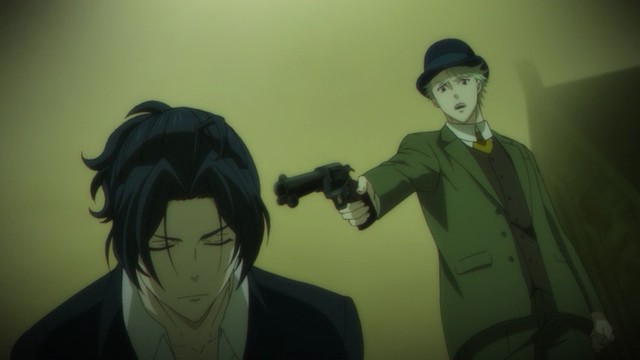
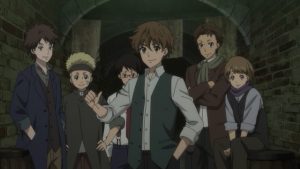

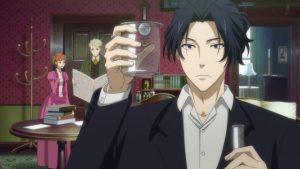
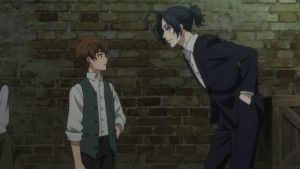
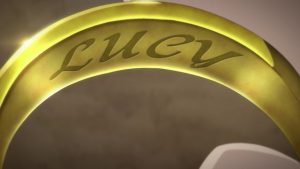
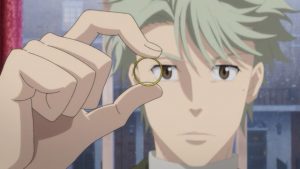
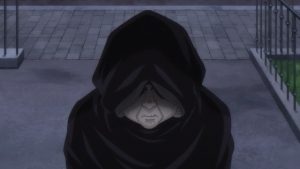
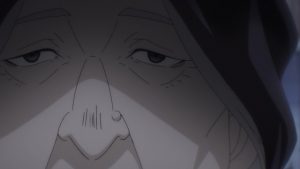
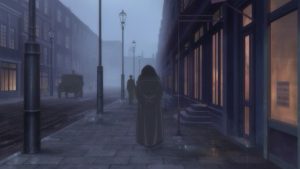

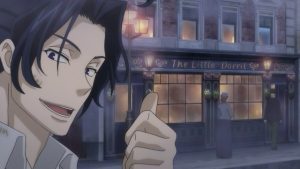
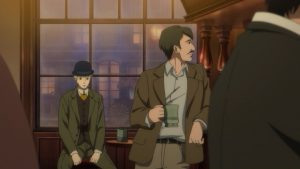
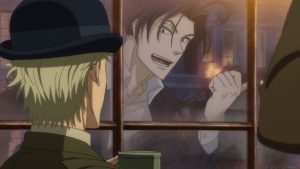

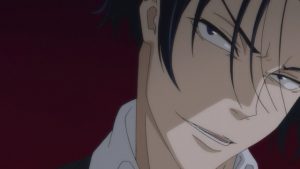
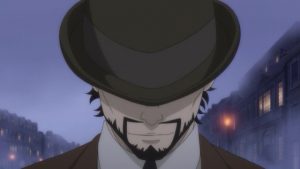
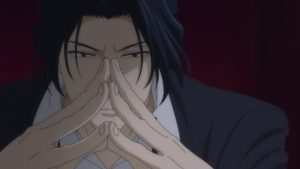
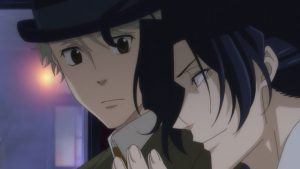
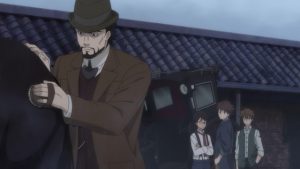
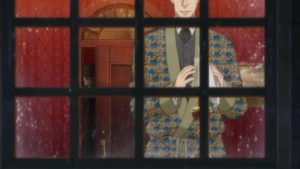
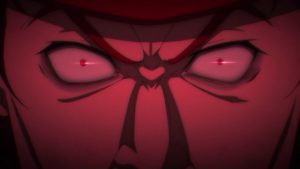
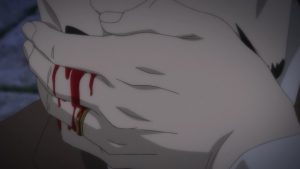
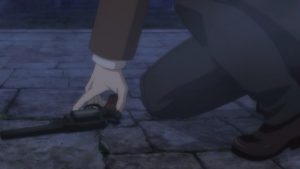



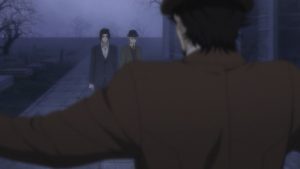


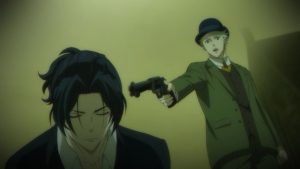
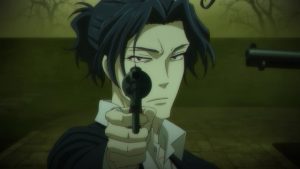
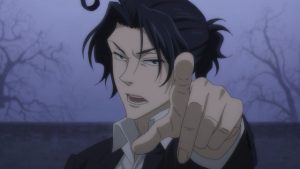
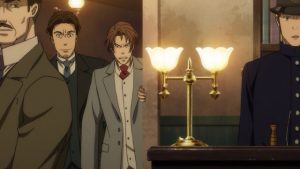
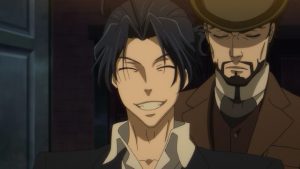
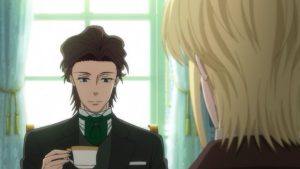

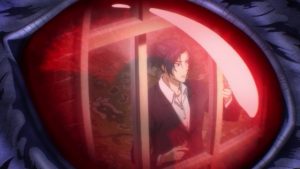


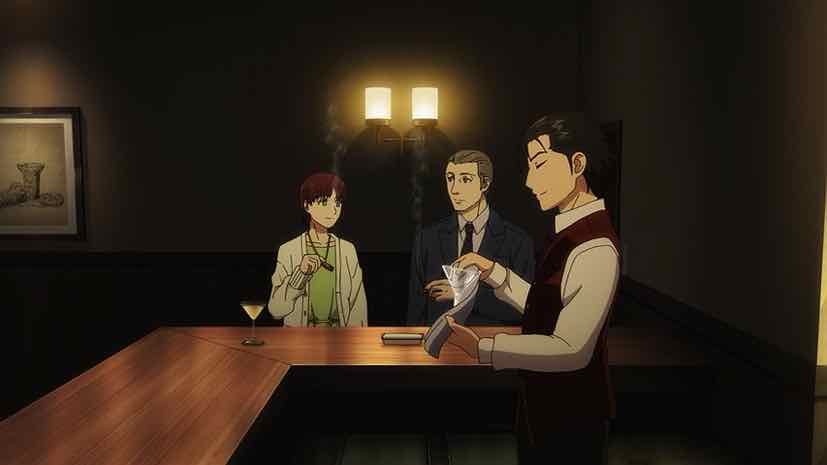
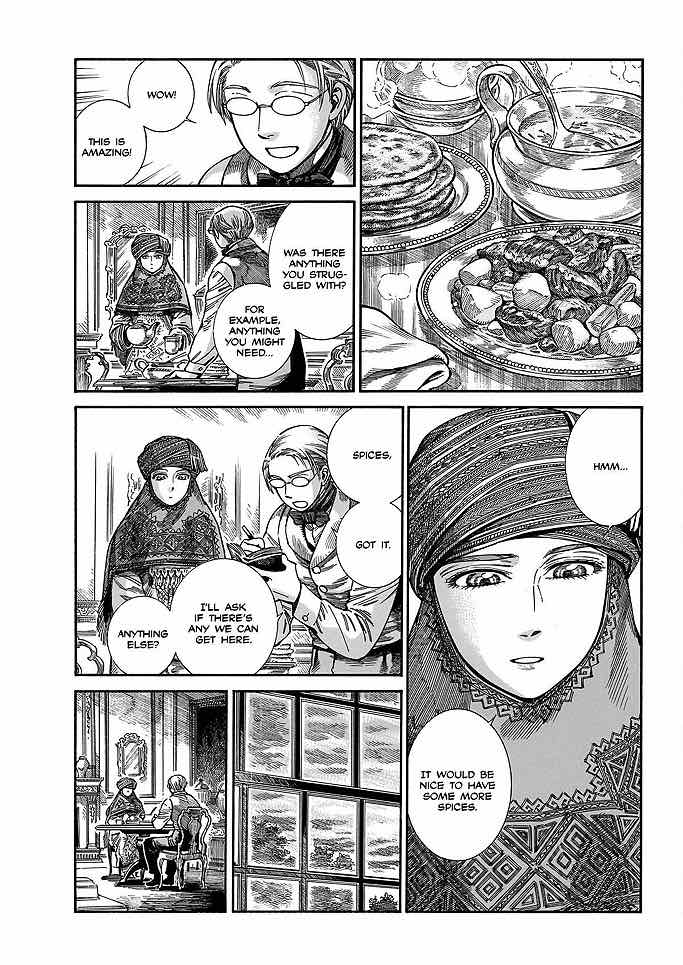
Riv
December 8, 2020 at 12:17 pmThese two episodes were a relief, I agree. But like you say, I am now much more invested in Sherlock as a character than I am in Moriarty. Also, I have to give a shout out to my all-time-favorite anime adaptation of Sherlock Holmes (and actually favorite adaptation in general). That would be Sherlock Hound, a children’s series from the 1980s. The episodes directed by Hayao Miyazaki are the best, although the whole series is good fun.
Guardian Enzo
December 8, 2020 at 12:53 pmIronically probably my favorite reimagining of the Holmes mythology was the two episodes ST:TNG did.
I’ve actually never seen Sherlock Hound. I probably should.
Gemsy-chan
December 10, 2020 at 10:17 amThe anime is missing a lot of stuff out from the manga. Before Noahtic arc we missed the MI6 story in how MI6 was founded, the introduction of Mycroft Holmes and Albert becoming head of MI6. Now we are going straight to the two detective arc which will miss out the baskerville arc that fleshes out both Fred & Louis and we’ll be missing the golden army arc which is Moran’s past and introduction to Moneypenny.
We are missing out a lot of character development, same as what they did in the earlier episodes where they cut out a lot of William’s character. I suppose they just want to hurry it up so its just between William and Sherlock.
Guardian Enzo
December 10, 2020 at 2:56 pmThat’s a shame, and you can sort of sense the absence of the missing material even if you can’t see it – like dark matter. But I still find a marked improvement now that Sherlock is in the house.
Mei
September 6, 2021 at 4:42 pmExcuse me, Wiggins is voiced by Yuki Sakakihara not Ayumu-chan